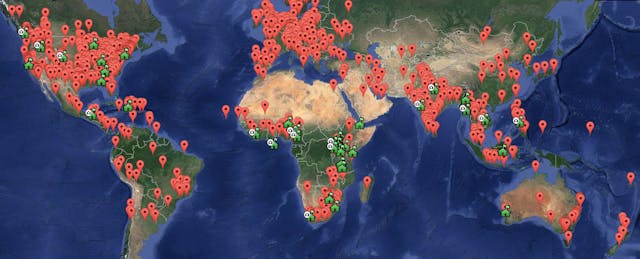Khan Academy has often been hailed as the world’s teacher. Unfortunately, an estimated 4.5 billion people have no Internet access. So when a former intern at Khan Academy, Jamie Alexandre, created an offline version of the platform, dubbed “KA Lite,” in December 2012, the world took notice.
Currently, Alexandre says KA Lite has been deployed in more than 30 schools, orphanages, and correctional facilities around the world. And this number doesn’t include the 3,000-plus confirmed installations in over 120 countries around the world. (This number is an underestimate since it is based on IP address and web downloads. An installation via a flash drive would not be counted.)
Here’s a map of the deployments.
KA Lite is an open source Python server that can be installed and run on any computer. Students can connect to this server using most devices. Originally designed to be run on the Raspberry Pi, Alexandre says over half of KA servers are now operating on old Windows computers.
Based in the newly dubbed “Innovation Space” in the Qualcomm Calit2 Institute at the University of California, San Diego, Alexandre and a team of 10 at The Foundation for Learning Equality are committed to keeping KA Lite running. In many ways, the foundation has become an unofficial partner of Khan Academy. The former intern stays in frequent touch with his former teammates to keep abreast on the latest developments. “We’re updating the [KA Lite] software every week or two, with larger releases every month or two,” says Alexandre. “Anytime people ask them how to run Khan in a low-bandwidth area, Khan sends them our way."
KA Lite currently boasts over 4,000 videos and exercises, but expect that number to jump to 7,000 after the team finishes implementing a new exercise framework.
Soon, KA Lite will allow teachers to create and share their own content. “Khan Academy has a great set of content that is highly curated,” says Alexandre. “It’s been translated, but it’s not the most culturally relevant.” The KA Lite platform will soon support teachers who want to create and upload their own lessons, says Dylan Barth, the foundation’s president.
KA Lite is not the only effort to make online content available in areas with no bandwidth. Zaya, based in India, sets up mobile blended labs using “education hotspots,” portable servers that share pre-loaded educational resources (including Khan Academy videos) with mobile devices in the local intranet network.
For all the focus on numbers and metrics, the specific impact on local communities may ultimately be immeasurable. It’s difficult to estimate the number of actual learners, says Barth. “At an orphanage in Cameroon, we have fourteen donated laptops with access to KA Lite. But devices are shared and used by others, and it’s become a learning hub for the community.”


